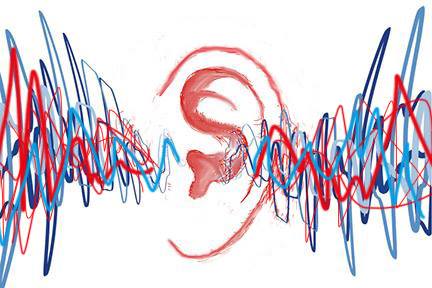If I were to ask what you know about hearing loss and tinnitus, most people would probably answer: “hearing loss is what old people get when they gradually become deaf, and, umm, tinnitus, isn’t that an illness when you hear ringing in your ears?”
Allow me to enlighten you…The acquisition of hearing loss is far from limited to old people! 62% of regular clubbers in Great Britain have symptoms of hearing loss. Sixty-two percent! That is an overwhelming number. A certain percentage of these people also have tinnitus, which is not an illness, but permanent damage done to your inner ear, which causes the emission of a high-pitched sound into your brain that only you can hear. Unsurprisingly, this is caused by ridiculously loud sound that people are exposed to in places such as clubs and at concerts.
This might be news to you, or you might have heard about it before but disregarded it as a myth. Well, it’s not. Tinnitus and noise-induced hearing loss (NIHL) are quite real, and, just to convince you, here are some people you certainly know of, who have gotten tinnitus due to sound exposure: Bob Dylan, Ozzy Osbourne, Anthony Kiedis (vocalist of Red Hot Chili Peppers), Neil Young, Chris Martin (vocalist of Coldplay), Lars Ulrich and James Hetfield (both Metallica band members), John Densmore (Doors drummer), Joey Jordison (Slipknot drummer), Mick Ronson (David Bowie’s guitarist), Louis Tomlinson (One Direction vocalist)… The list goes on and on.
Now you might be wondering: well, if noise-induced tinnitus is so common, how come nobody’s warned me about it? Ah, good question. The best answer to that is probably that tinnitus cannot kill anybody. Not directly, anyway. Society warns us about things that are potentially lethal, such as drugs, alcohol and cigarettes. The warning signs for these are hard to miss. We trust society to tell us about things that are dangerous. So, if there are no warnings about objects, we automatically assume that they are safe.
But who are we really trusting? Obviously, companies earning an enormous amount of money from playing loud music in basements couldn’t care less about your health. A quote from an interview with San Franciscan club owner Page Hodel really says it all:
“Still, Hodel says exposure to dance club noise is voluntary. ’Nobody is making anyone walk through that door. … If you have 950 people who love it and want it so loud they can’t even see straight and two others who want it low, then hey, maybe those people should go somewhere else.’” (http://www.hearnet.com/features/articles/artist_article_EdWclub.shtml)
Despite the fact that Hodel has NIHL herself, she doesn’t seem too keen on raising awareness of the risk of hearing damage in her clubs. Most club owners behave in the same way; despite being aware of the problem, very few bother to inform visitors about the hazard. And why should they?
In America, by law, the National Institute for Occupational Safety and Health (NIOSH) is required to govern noise levels in the workplace, as well as inform the workers about the necessity of wearing protection if the noise levels are high. However, a nightclub is not a workplace for clubgoers, so the law simply does not apply. Meanwhile, NIOSH recommends that any workers exposed to noises louder than 100 decibels should wear both earplugs and earmuffs simultaneously. The noise level in nightclubs and at concerts may exceed 110 decibels. Needless to say, refraining from protecting your ears in this environment is absurd. In Sweden, the law is stricter; a limit of 100 decibels is set up, but this does not mean that clubs and concerts in Sweden do not have the potential to damage your hearing! 100 decibels is enough to damage your hearing for good, not to mention the fact that the law is not always followed (http://www.aftonbladet.se/nyheter/article10822855.ab).
What is written here does not only apply to regular clubbers, concertgoers and musicians. It applies to everyone. Even if you don’t expose yourself to loud music often, there is a risk of damaging your hearing. You might not get tinnitus, or notice the hearing loss immediately, but as you get older, your hearing will worsen sooner than that of people who have avoided loud noise. (That is, of course, unless you happen to belong to the percentage of people who are not damaged by loud noise.)
So, how can NIHL and tinnitus be avoided? Quite simply: use hearing protection! I’m not suggesting that you use both ear muffs and ear plugs simultaneously, since this precaution is for workers who are exposed to more than 100dB for several hours every day. Simple foam earplugs are enough to spare you the trouble!
I, and other uninformed people with sensitive ears (there are many more than you would think), have been unfortunate enough to discover all the above through experience. I acquired my tinnitus half a year ago, as a result of the organized skivor and flak in my last semester at Kungsholmen’s gymnasium. I did not use earplugs at any occasion. The flak on my graduation day was the last straw, and I have had tinnitus ever since. The important thing to me now is raising awareness so that people have access to this kind of information and at least might consider protecting their ears. Share this with your friends; you might spare someone months, or even years of struggle.
A side note on tinnitus:
Tinnitus caused by loud noise is often temporary, disappearing after a span of a few minutes to a few months. However, the more you expose yourself to loud noise without using protection, the greater the risk of getting permanent tinnitus, as the nerve cells in the damaged inner ears heal very slowly. Additionally, permanent as well as temporary tinnitus might occur because of other reasons, such as health conditions, or simply by itself, but this is not the focus of the text.


